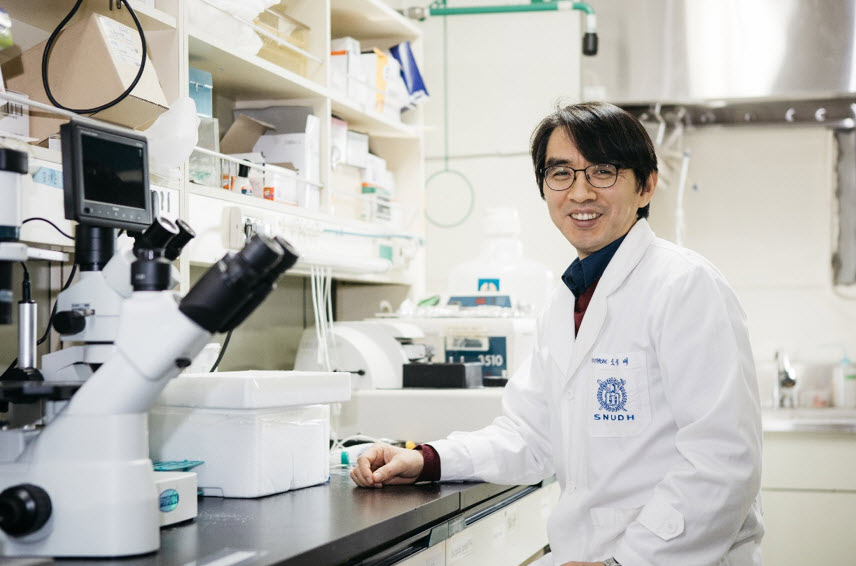Professor Seog-Bae Oh (School of Dentistry) has been devoted to defining and investigating the experience of pain, looking into mechanisms that cause pain and developing new ways to treat chronic pain. His work has been published by world-renowned life sciences journals such as Cell and Neuron. In 2010 he founded an academic society for pain researchers in Korea and successfully hosted a global conference in 2019, greatly advancing the nation’s position in pain research. In acknowledgement of his efforts and achievements he was awarded the Yudang Award from the Korean Physiological Society in 2012 and the Jang Jin Award from the Korean Society for Brain and Neural Sciences in 2019.
The English Editors team reached out to him to learn more about his research philosophy. The following is an edited transcript of the interview.

Professor Seog-Bae Oh (School of Dentistry), Recipient of the 2020 Excellence in Research Award
Congratulations on receiving the 2020 Excellence in Research Award! How do you feel?
I have spent the last thirty years immersed in the study of pain, and it is a great joy and honor to receive the Excellence in Research Award. I thank the state sponsors who have made my research possible, SNU as well as the School of Dentistry for creating an environment where I have been able to wholly concentrate on my studies. I also have to mention the members of my lab— former students, grad students, researchers, and administrative staff who have given their all despite numerous obstacles in order to make this happen. Last but not least, I’d like to share this joy with my family.
After graduating from the School of Dentistry, you have been studying neurobiology and pain, with particular focus on transient receptor potential (TRP) ion channels and the immune system. Could you briefly introduce your research and research methods?
TRP channels are receptors in the sensory nerve endings of the peripheral nervous system, and they transduce heat stimuli to pain signals. In my lab, we have discovered that TRP channels also exist in the central nervous system and amplify pain stimuli to cause hypersensitivity to pain. We have also discovered that the TRP channels in teeth play a big role in causing toothaches. Chronic pain is often refractory because once the nervous system (which delivers pain signals) is hyper-activated, it does not easily calm down. Instead of addressing the countless causes of this hyperactivity, we decided to focus on developing a method to remove the specific nerves whose signals had unusually intensified. During the course of this, we came across Natural Killer (NK) cells that destroy cancer cells.
If I had limited my research to the field of neurology, the results would have fallen short of what we finally achieved. Reference to the neighboring discipline of immunology made our discovery possible, and I am sure convergent research in other areas will lead to many more significant results.
How can this be applied to the treatment of patients?
Many patients around me suffer from pain, but the analgesics available today provide only symptomatic relief and are associated with severe side effects, which especially limits their usage in the treatment of chronic pain. A new target for treatment should be sought in the neural transmission route, and I hope that our research on those targets advances to stages of clinical research and technology transfer so that it may eventually be used in managing the pain of patients.
Our lab has recently discovered that NK cells precipitate the degeneration of damaged peripheral nerves. We have also proven that the deliberate activation of NK cells can remove damaged nerves, making room for new and healthy nerves-- this whole process would serve as a cure for chronic pain. In other words, refractory chronic pain is caused by the damaged nerves that remain in the body, and immunotherapy utilizing NK cells can serve as a radical treatment for this issue.
What are your future plans as a researcher and educator?
After publishing my research, I received many phone calls and e-mails from patients suffering from chronic pain. This reminded me once again of the weight that pain research carries, and it is a shame that I cannot make a direct impact in these patients’ lives at the moment. In the ten years that I have left until my retirement, I wish to conduct follow-up studies in this area and advance it to the level of clinical research. I also hope my work can bring attention to the importance of pain research in Korea, where it is not a major focus of study.
Personally, I aim to be a good advisor to students in guiding their path towards becoming skilled researchers and scientists. I especially want to present the prospect of pursuing a career as a full-time researcher to dentistry students who often limit their goals to becoming a clinician.
Is there any advice you would like to give to current SNU students?
College can be tough because it’s when you have to find out how to stand on your own feet. It is also a crucial stage in your life where you establish your personal values. I understand that improved accessibility to information doesn’t necessarily make things easier, but I believe that our students are more than capable of finding out what really matters to them, and making bold steps to realize their dreams. I wish you all the best, and hope you maintain a healthy balance of career and physical/mental health along the way.
Written by Hyunjoo Lee, SNU English Editor, legohj1001@snu.ac.kr
Reviewed by Professor Travis Smith, Department of Asian Languages and Civilizations, tlsmith@snu.ac.kr

